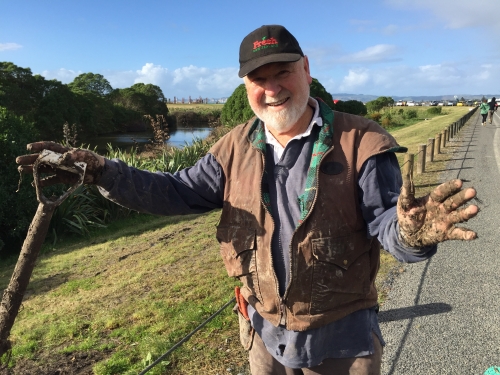
Current filter:

- Chairman Rex Graham, published as a Talking Point in Hawke's Bay Today 8 February.
I have strong sympathy for many of the points made by Barrie Ridler in his recent Talking Point. We all understand his frustration and recognise the big job ahead to restore our rivers, streams, lakes, estuaries and the coastal marine environment.
Our regional council is focused on being part of the solution.
Our councillors and the community are more interested than ever in protecting and enhancing our environment. We are all impatient for change and need to work together to achieve it. This need to work with and empower our community underpins our approach in our Long Term Plan 2018-28 and is evident across the regional council's initiatives.
I certainly agree with Barrie that growing grass to feed animals on light soils, using vast amounts of water and fertiliser is not good land use and is probably not a sustainable enterprise.
Equally the "first in, first served" rule in the Resource Management Act is ill-conceived and poorly thought out legislation, which has driven inequity and unsustainable practices. We need central government to help us change this, which is why the regional council is intimately involved in the current freshwater reforms.
The Tukituki Water Taskforce, which was set up late last year to develop solutions to water use efficiency in Central Hawke's Bay, is a collaboration of councils, water users, local residents, environmental groups and local taiwhenua.
The taskforce approached the regional council with a request to delay the implementation of higher minimum flows in the Tukituki River. Not to "support a few large farms" but to give the taskforce time to find effective, sustainable long-term water quantity solutions following the failure of the Ruataniwha Dam project.
The council and the region's nine Treaty partners carefully considered this request and following vigorous debate accepted the two-year moratorium should be formally considered.
We understand that in many parts of our region land use needs to change. We now have stringent nitrogen and phosphorus limits for the Tukituki Catchment, and tighter land-use regulation away from more polluting activities.
Furthermore, the regional council is taking a tougher stance on feedlots and has met with the minister requesting central government backs us up with stronger national regulation. He has agreed and instructed his staff to prepare new rules for feedlots.
In the last year we have funded a major increase in consenting and compliance staff to support stronger regulation of farming and forestry for better water quality. We have doubled our planning team to create more rules on land use quicker so we can outlaw poor land-use practices.
We have carefully balanced this increase in regulation with greater support for farmers, by also doubling our team working alongside landowners and creating a $30 million fund to support fencing, tree planting and erosion control.
We are making great progress in pest control and protecting biodiversity. Our new Predator Free project is getting under way on Mahia Peninsula as an initial step towards ridding the region of predators.
We are building stronger partnerships with tangata whenua, with the appointment of a senior Māori leader in the regional council and the signing of the Kahutia Accord with Ngāti Kahungunu, which aims to plant millions of trees on erosion-prone land across Hawke's Bay.
We have joined forces with the University of Waikato to foster new research to drive behaviour change toward more sustainable use of natural resources.
Our TANK Plan Change for the Heretaunga Plains will see controls of stormwater significantly tightened, including city discharges to the Ahuriri Estuary and Karamu Stream.
The strong regulatory stance taken by the regional council has also been key to getting Central Hawke's Bay District Council's wastewater upgraded.
We have kept in close contact with PanPac Forest Products as it grapples with fixing its broken wastewater outfall, to ensure it is doing everything in its power to have the leak fixed as soon as possible.
Late last year we undertook the most comprehensive community consultation we have ever done on how to fund the future growth of Napier Port. We received more than 3500 submissions and heard a very clear message from our ratepayers that they want to retain local ownership.
We listened, and are looking towards a minority share market listing around the middle of this year, with a focus on prioritising shares for locals who wish to invest.
At the end of the day everyone one of us makes an environmental impact in some way and by working as a team we can make a positive difference.
12 April 2021
Disclaimers and Copyright
While every endeavour has been taken by the Hawke's Bay Regional Council to ensure that the information on this website is
accurate and up to date, Hawke's Bay Regional Council shall not be liable for any loss suffered through the use, directly or indirectly, of information on this website. Information contained has been assembled in good faith.
Some of the information available in this site is from the New Zealand Public domain and supplied by relevant
government agencies. Hawke's Bay Regional Council cannot accept any liability for its accuracy or content.
Portions of the information and material on this site, including data, pages, documents, online
graphics and images are protected by copyright, unless specifically notified to the contrary. Externally sourced
information or material is copyright to the respective provider.
© Hawke's Bay Regional Council - www.hbrc.govt.nz / +64 6 835 9200 / info@hbrc.govt.nz